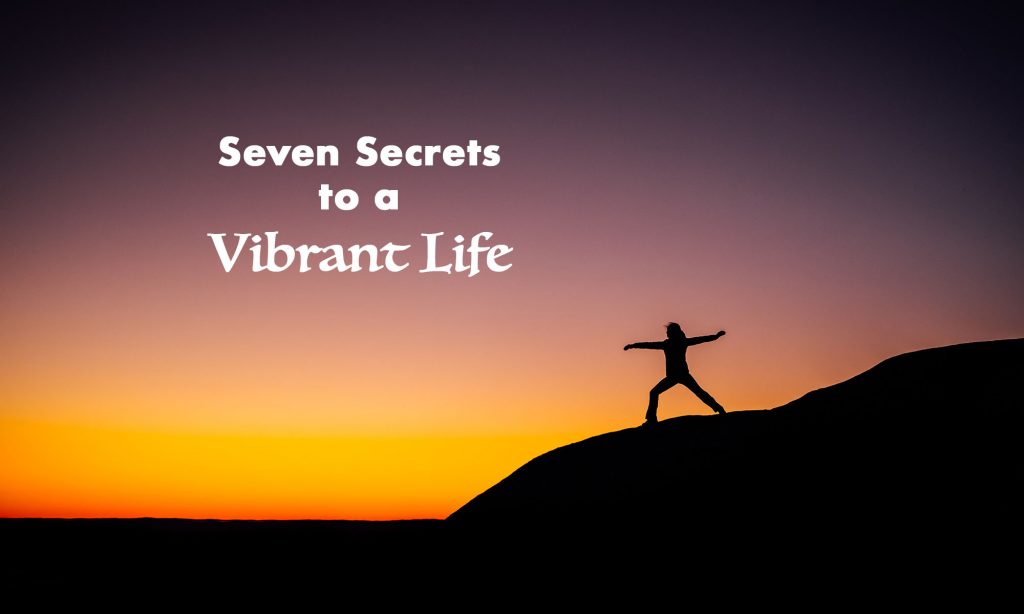
In the middle of the night when I should be sleeping I sometimes find myself reflecting: Am I enjoying a vibrant life? Bright colors or muted grays? Energy, vitality, excitement or lethargy, depression, and boredom?
I don’t want to sleepwalk through my life, I want to be fully awake, to live with intention, compassion, and kindness.
I turned 50 this year. I’m at the halfway mark. Or, more likely, well past it. My grandmother died at 63. Mom, Lynn Margulis, died at 73. My oldest daughter says I’m going to die at 83 and her plan is to die at 93.
Or I could get hit by a car tomorrow. None of us can predict when or how we will die. But what I know for sure is that I need to live my life right now today to the fullest extent I can.
Inspired by Mary Oliver
I love this Mary Oliver poem:
The Summer Day
Who made the world?
Who made the swan, and the black bear?
Who made the grasshopper?
This grasshopper, I mean-
the one who has flung herself out of the grass,
the one who is eating sugar out of my hand,
who is moving her jaws back and forth instead of up and down-
who is gazing around with her enormous and complicated eyes.
Now she lifts her pale forearms and thoroughly washes her face.
Now she snaps her wings open, and floats away.
I don’t know exactly what a prayer is.
I do know how to pay attention, how to fall down
into the grass, how to kneel down in the grass,
how to be idle and blessed, how to stroll through the fields,
which is what I have been doing all day.
Tell me, what else should I have done?
Doesn’t everything die at last, and too soon?
Tell me, what is it you plan to do
with your one wild and precious life?
~Mary Oliver, from New and Selected Poems, first published in 1992 (my emphasis)
So what does it mean to live a vibrant life?
Here are what I consider to be the seven keys to living a vibrant life.
Seven secrets to a vibrant life
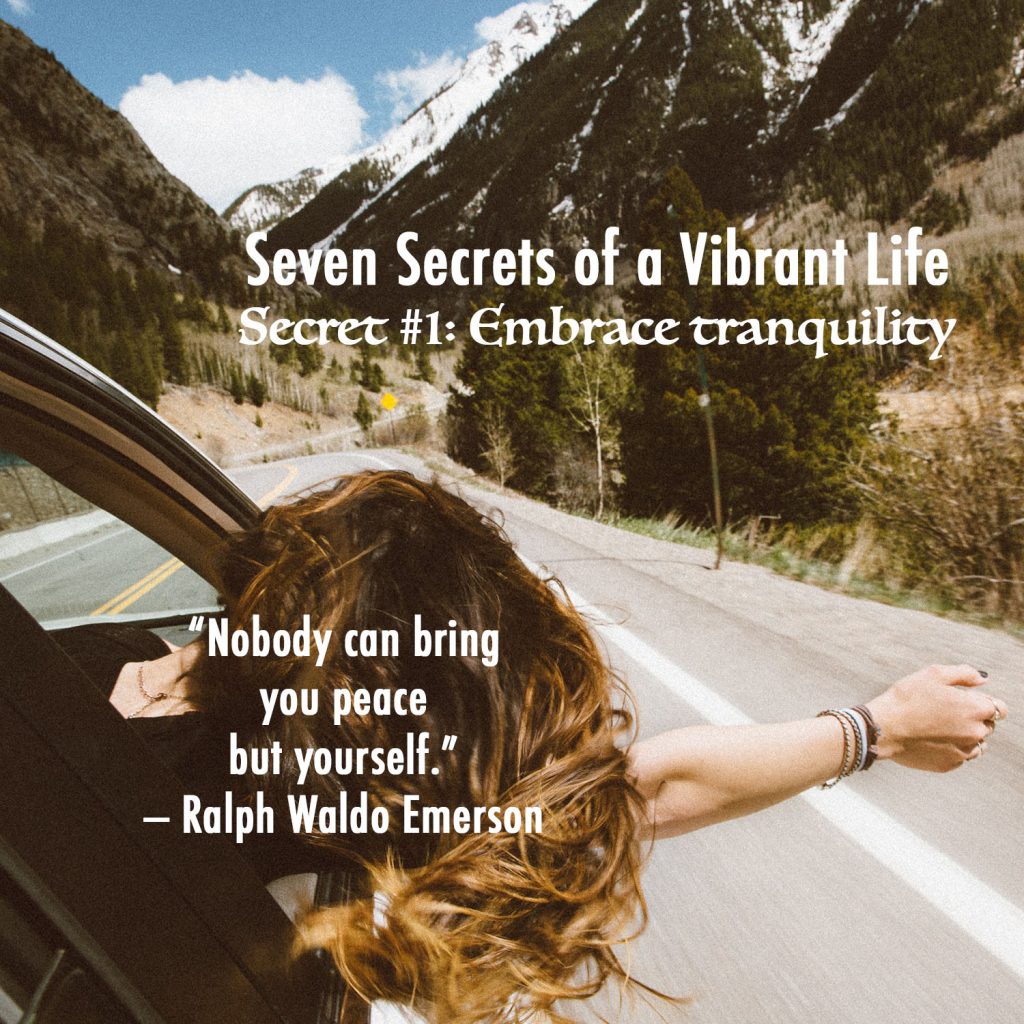
Secret #1: Embrace tranquility
Eight in 10 Americans say they are stressed out, according to Gallup. We’ve learned that it’s okay, even expected, to be anxious and tense. But stress is a chronic condition that isn’t good for us.
In fact, stress is devastating to the immune system, putting us at higher risk for cardiac problems, stroke, and even autoimmune diseases. It attacks our physical health and affects our mental wellbeing.
But stress doesn’t need to be a way of life. People in other industrialized countries, including Iceland and Switzerland, report being less stressed and much happier. (Here are the ten least stressed out countries in the world).
We can make a conscious decision to choose calm over chaos, serenity over stress.
That means playing games you aren’t good at (because you don’t care about beating your opponent, you’re just there to enjoy yourself), taking time off work in the middle of the day (why not?), and making measured and permanent changes to your life to reduce your stress.

Secret #2 for a vibrant life: Make love
Love is critical to the human spirit. We love our children, our families, our friends, and the other significant people in our lives. We can also love strangers, and even send love to people we don’t like. When we approach all people with love and kindness, we spread goodwill.
We know from scientific research that smiles are contagious.
Sending love and being loving to others also has a ripple effect, helping us heal ourselves and the planet.
The more loving you are to yourself and to others, the more vibrant your life becomes.
Mutually consensual love-making is awesome too! Sex has amazing scientifically proven health benefits (not the least of which is stress reduction. See #1).
Even if you aren’t in a relationship, and don’t want to be, you can add vibrancy to your life by fostering close friendships, practicing self-love (both emotionally and physically!), and going out of your way to perform acts of kindness.
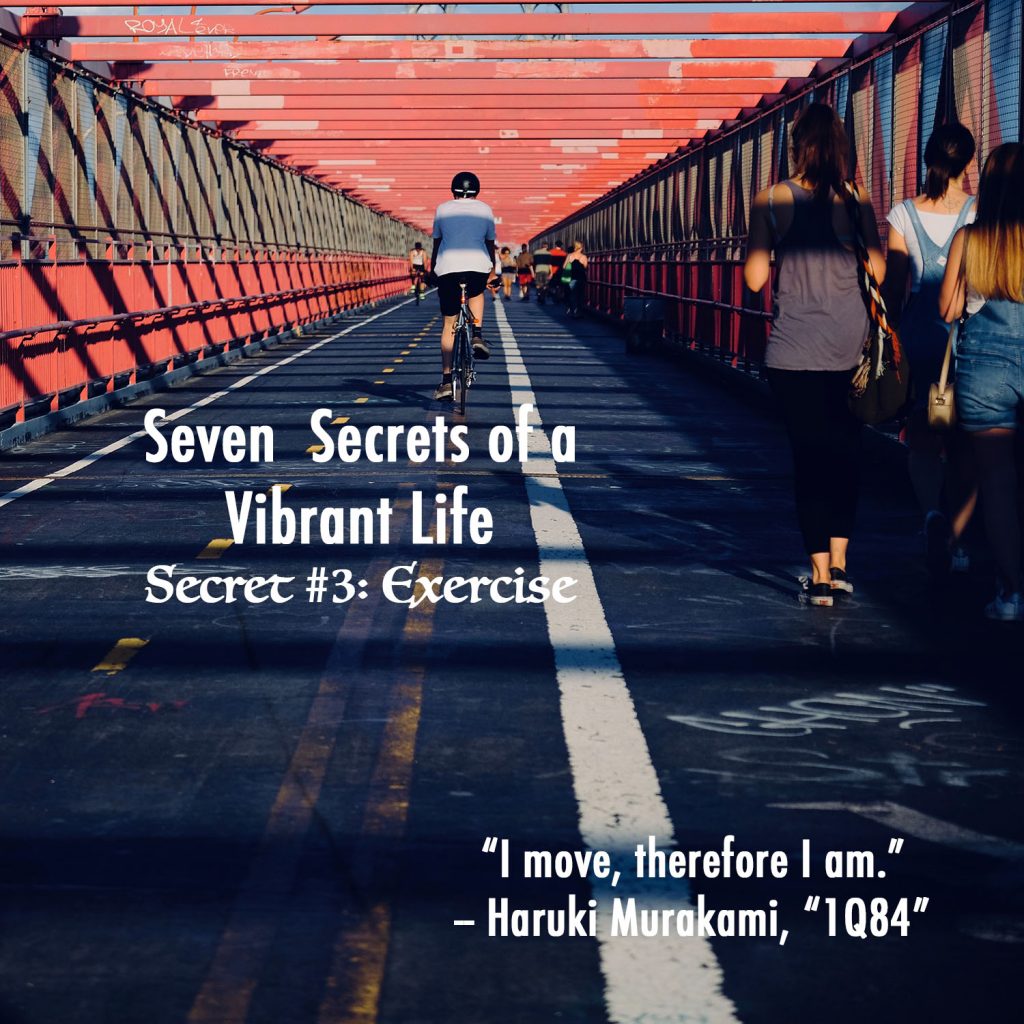
Secret #3 for a vibrant life: Exercise
Almost everyone I’ve ever talked to would like to live a long life. But most of us don’t want the aches, pains, wrinkles, and other complaints that often accompany old age. What we want is to grow old gracefully and live vibrantly.
Dan Buettner, a high-powered exuberant Guinness-Book-of-World-Records-setting journalist who worked for National Geographic, went on a multi-nation search for the secret formula for vibrant living. He and his team of longevity researchers came up with nine keys. They call these the “Power Nine.”
One of his recommendations that seems counterintuitive in our Age of Convenience is that Buettner recommends inconveniencing your life as much as you can in order to build in natural movement into your day.
Exercise is awesome, don’t get me wrong. Walking, running, hiking, playing soccer and basketball (these are my two favorite sports), swimming, dancing, scootering, skateboarding—any exercise adds vibrancy and color to your day.
But if you’re mobility impaired or you’d rather have a head cold than go for a job, you can still get the benefits of exercise without ever stepping foot in the gym.
Walk or bike for transportation, take the stairs instead of the elevator, park one block away from your destination so you get a short walk in, get up to change the channel on the TV instead of using the remote.
It turns out that incorporating movement into your day may actually be better for your health than blowing yourself out with strenuous exercise.
In one 2015 study published in the Journal of the American College of Cardiology, Danish researchers found that strenuous exercise may actually undo the health benefits of exercise. Those with the lowest chance of dying during the study’s 12-year period were people who exercised but did so moderately: less than three times a week for less than 2.4 hours total at a slow to moderate pace.
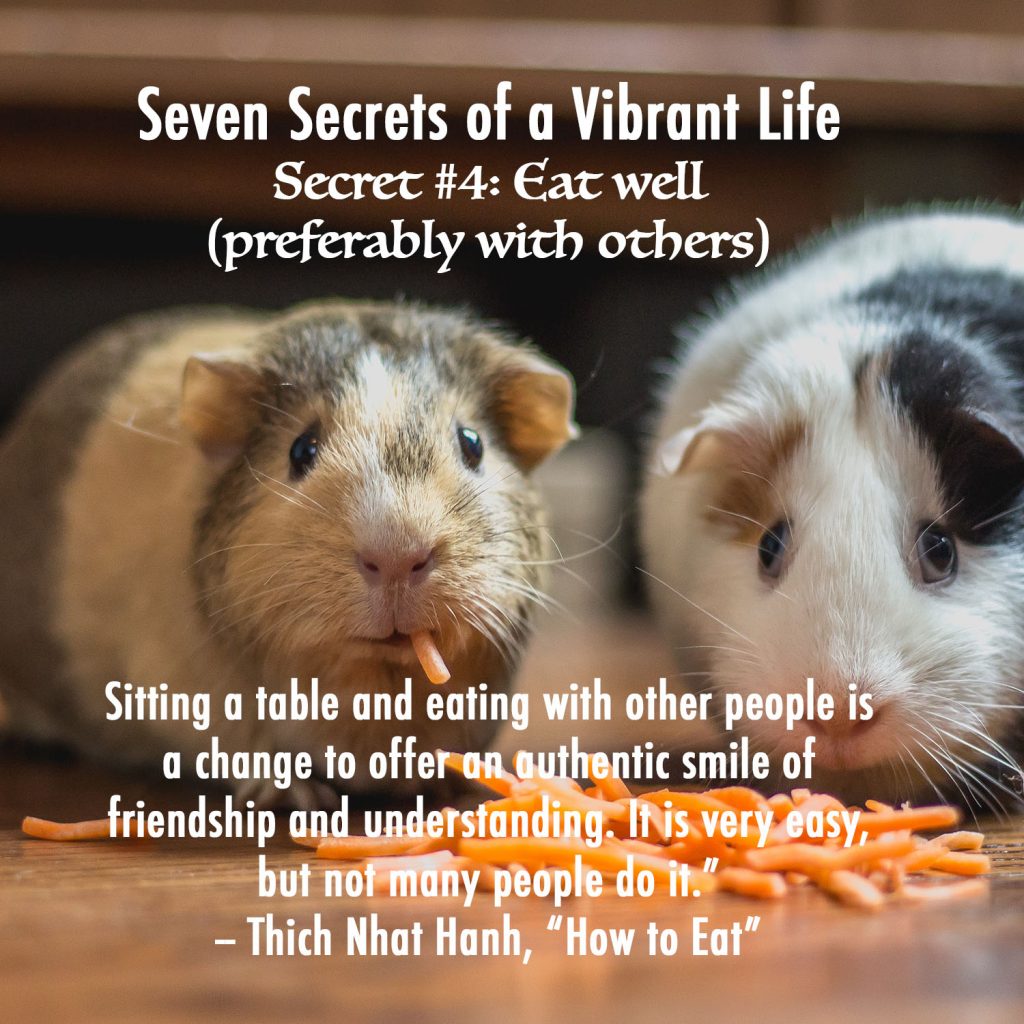
Secret #4 for a vibrant life: Eat well (preferably with others!)
Humans find happiness in community. Even if you’re an introvert, it turns out that you need to spend some time around others.
Humans also need nutritious food in order to survive and thrive, of course.
I believe that paying attention to what you eat, reveling in the colors and textures of your food, exploring new foods and new restaurants adds vibrancy to your life.
Choose whole, fresh, healthy foods as close to their natural state as you can.
Not only is organic real food delicious and better for you, it also helps your body fight off infections, and it staves off the aches and pains that tend to worsen when we age.
How you eat is important too. Don’t buy a burger in the drive-through and eat it in your car. We need to enjoy food in community.
Sit down with friends and family for dinner. Say a prayer or have a moment of silence before you eat. Engage in interesting conversations while you enjoy your food.
Take your time (see #1).
The more joyful your mealtimes are, the more vibrant and connected you will feel.
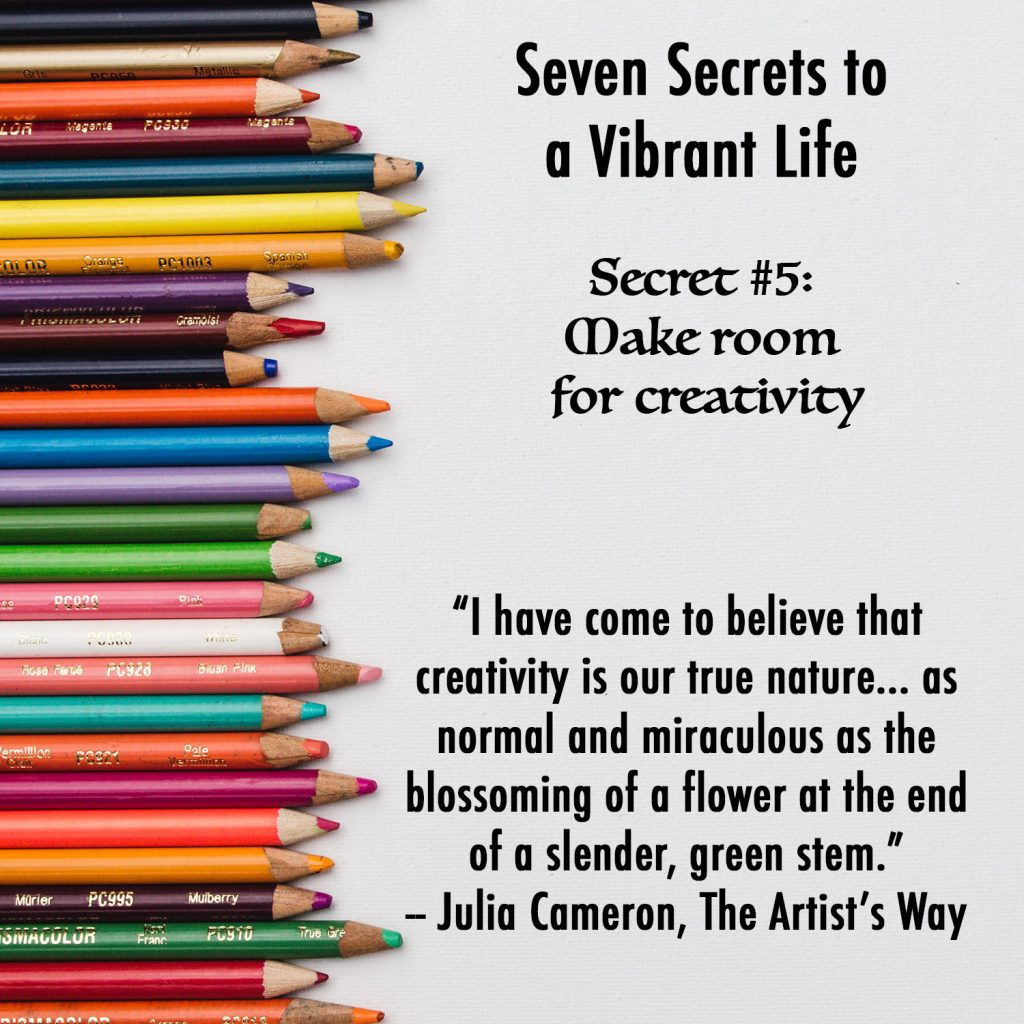
Secret #5 for a vibrant life: Make room for creativity
As children, most of us learn to be practical and to stay on point. Our parents want us to put schoolwork over pretend play, prioritize college applications over creativity. We learn as we grow up that daydreaming and doodling are “wasting time.”
But being creative—tapping into the beauty and abundance that is all around us—is another key to vibrant living. Creativity isn’t practical. It never has been. And why should it be?
That is wisdom from Julia Cameron, writer, novelist, creativity guru, and author of The Artist’s Way.
What does it mean to be creative? It might mean making babies (see #2), or planting a gorgeous flower-filled bee-attracting garden.
It might mean writing the great American novel, illustrating your own children’s book, or learning how to sew.
Or perhaps it means going to a week-long adult summer camp to take a cooking class (see #4), or finally learning how to hula dance.
Creativity means different things for different people. There’s no right way to be creative. And you don’t have to “be good at it.” (In my mind talent is irrelevant. What matters is doing it.) Silencing the voices of self-doubt in your head. Allowing creativity into your life will bring you a deep sense of tranquility (see #1) and happiness.
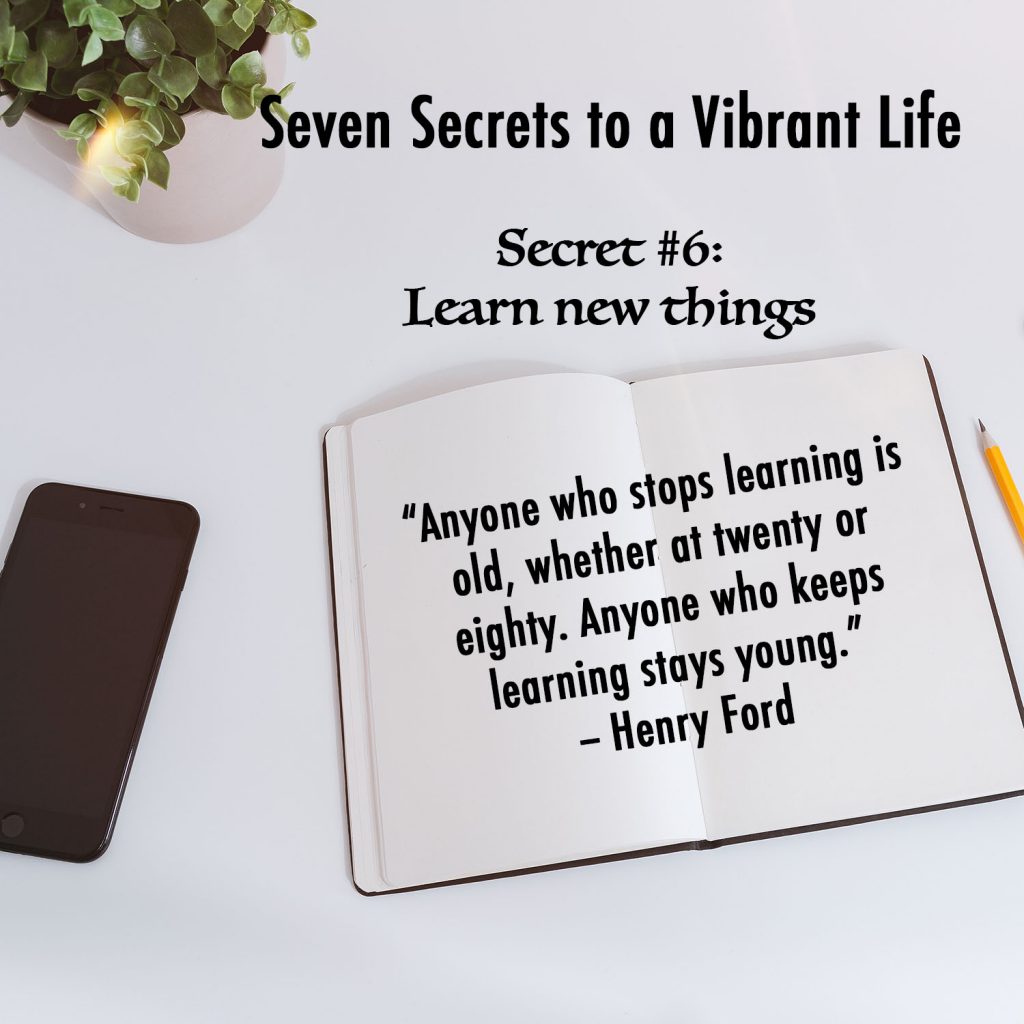
Secret #6 for a vibrant life: Learn new things
It’s always good to get out into the world and experience new things, new cultures, and new people.
You’re shaking your head, thinking to yourself that your budget doesn’t allow for travel right now.
Fair enough.
While traveling is awesome, you don’t have to have money to meet new people and learn new things. You just have to be willing! Study a foreign language with an audio program you get from your local library, host an Italian evening with some friends where you watch a cooking video together and make an Italian meal.
Volunteer at a homeless shelter and make an effort to sit with the guests and get to know them.
Be a tourist in your own town and visit places you have never gone before. Spend a quiet moment thinking about things you loved as a kid (maybe it was macrame, maybe it was astrophysics) and sign up for a class in that subject or find a teacher by contacting your local art non-profit or the closest community college.
Choose a topic that makes you deeply uncomfortable (Racism? Circumcision? Vaccine safety?) and commit to learning about it from all sides. Add vibrancy to your life by being open-minded and exploring.
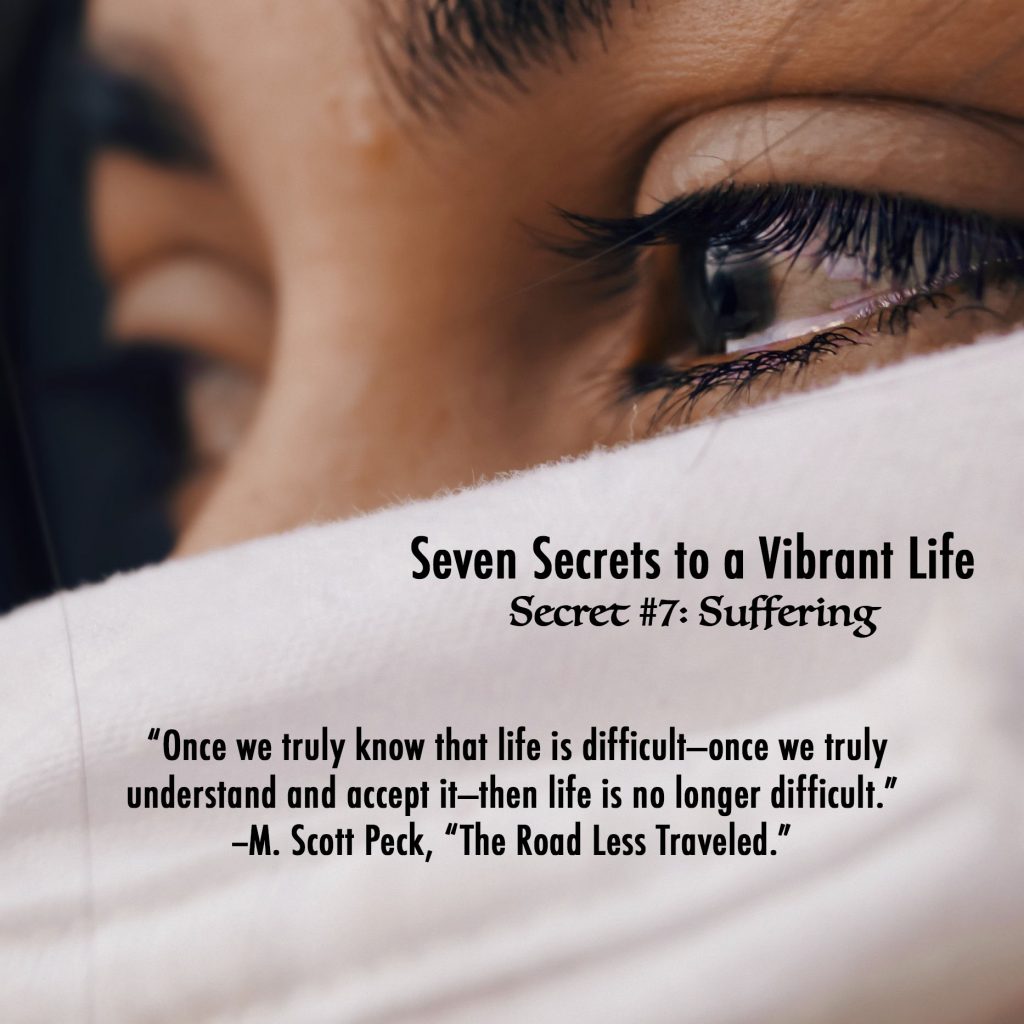
Secret #7: Suffer
Why would suffering (or sorrow or grief) be on my list of seven keys to a vibrant life?
Because without the lows I don’t know if you can really appreciate the highs.
After all, if you’ve never really struggled, suffered, or had to work hard for something, have you really lived a vibrant life? I’m not suggesting you seek out suffering. But I am suggesting that when it arrives, as it inevitably will, approach with a sense of purpose and acceptance, understanding that suffering makes our lives richer, fuller, and more meaningful.
M. Scott Peck, M.D.’s transcendent book, The Road Less Traveled, points out the Buddhist idea of accepting suffering as a means of moving past it. “Once we truly know that life is difficult—once we truly understand and accept it—then life is no longer difficult,” Peck writes. “Because once it is accepted, the fact that life is difficult no longer matters.”
If you made it this far, thanks for reading.
Now you tell me: what are you doing and what do you plan to do in the future with this one wild, difficult, interesting, fleeting, and oh-so-precious life?
Leave a Reply